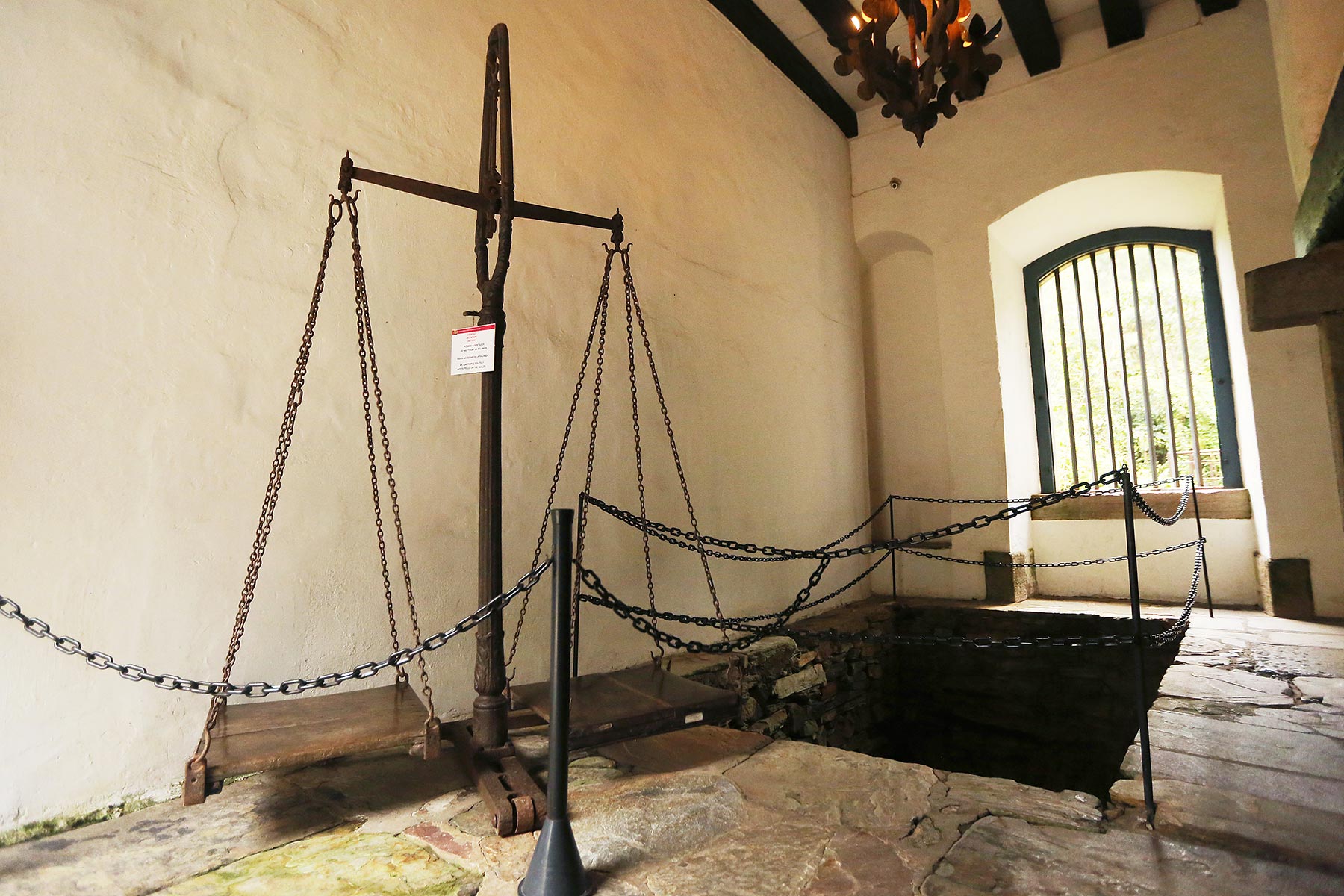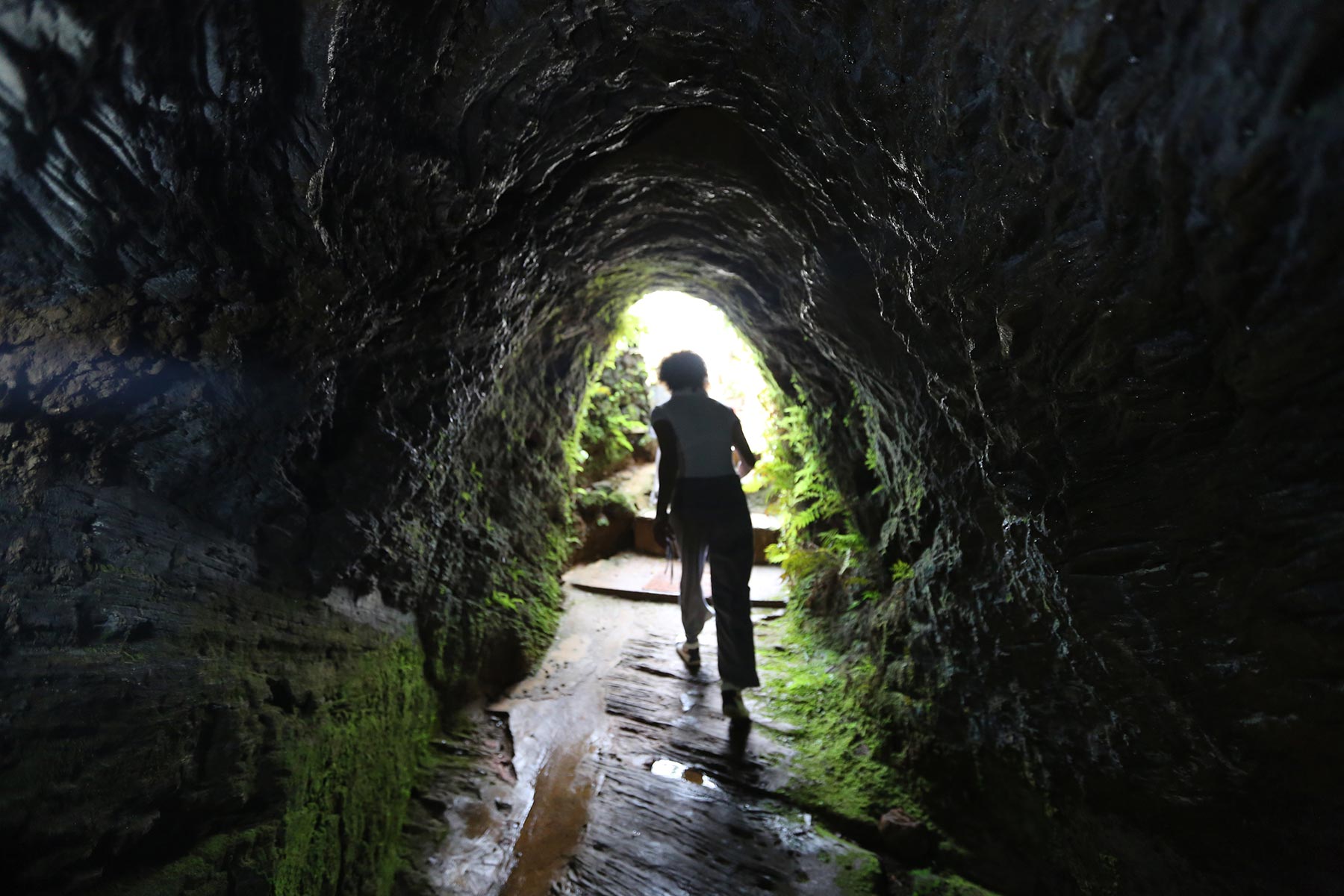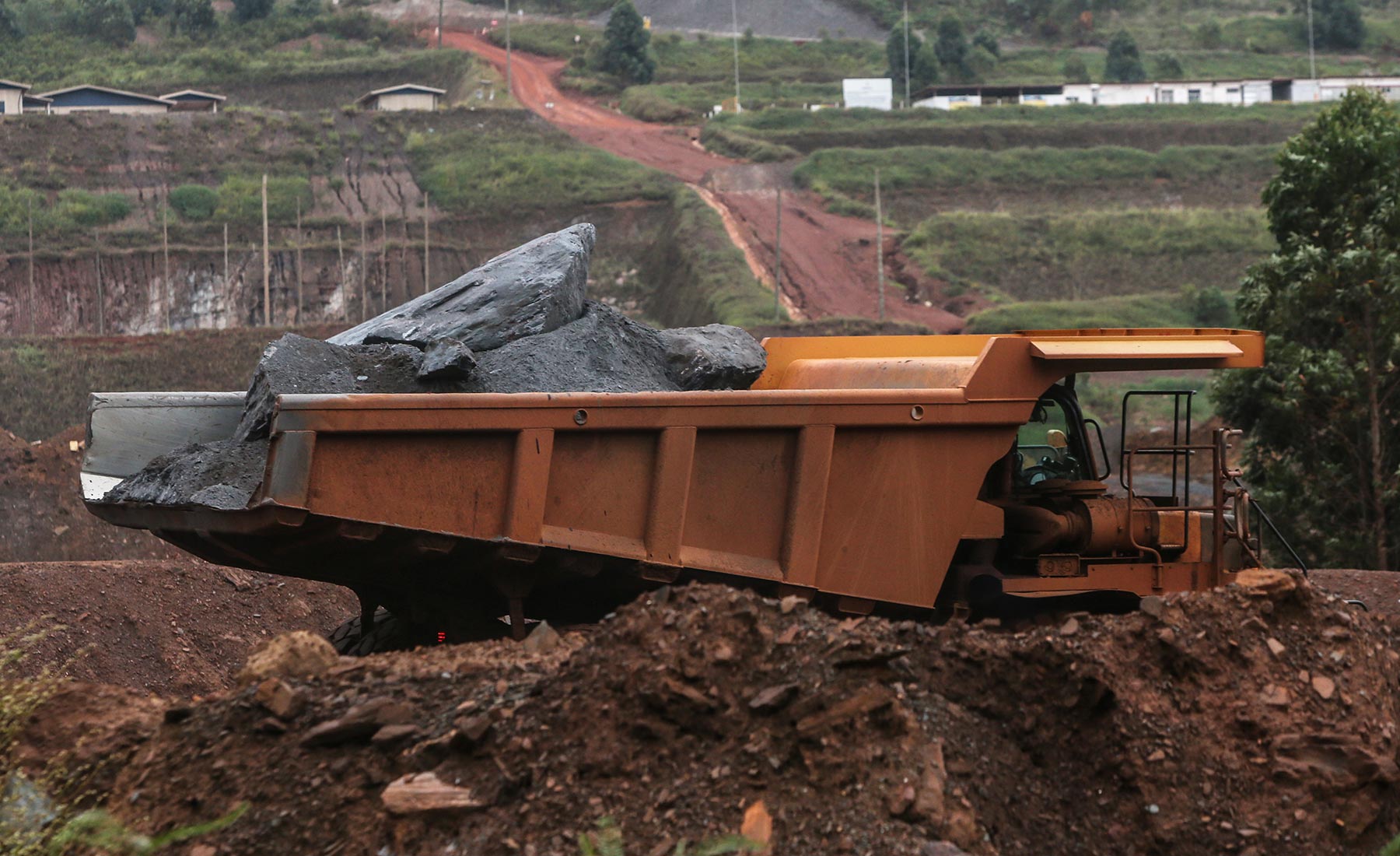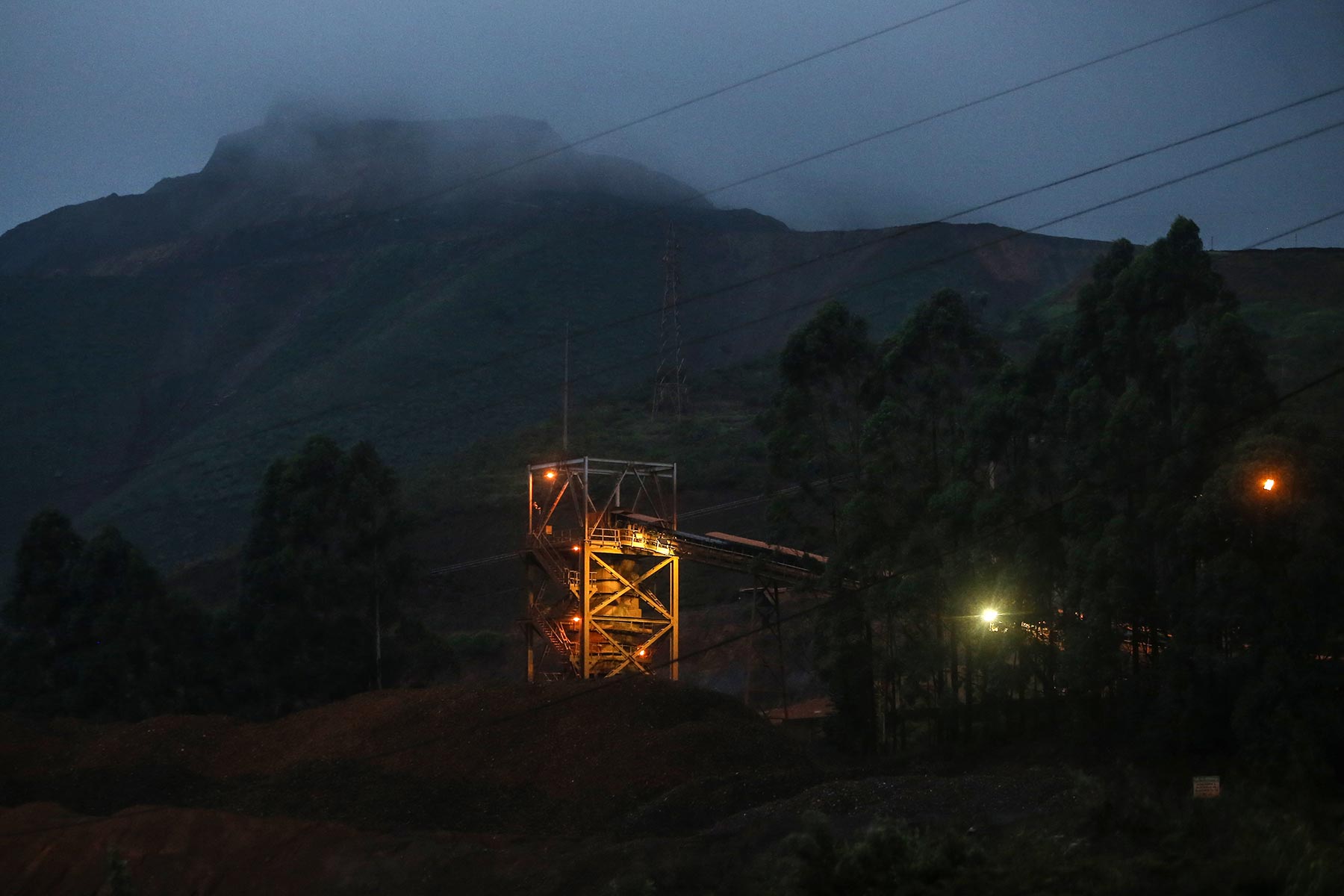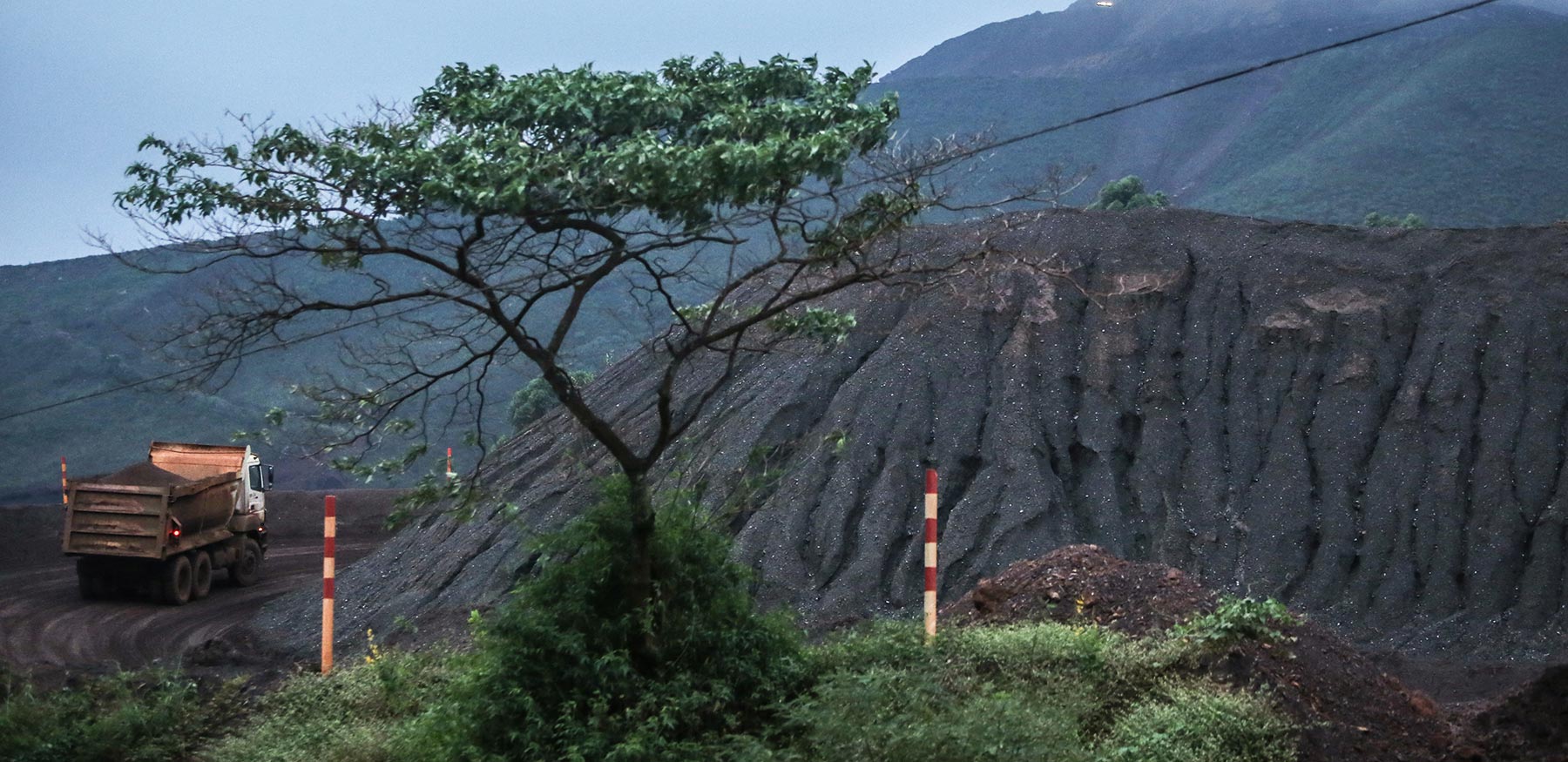
Mining misery in Brazil
Subcontracting slavery: How big companies in Brazil get away with it
Series
This is the third in an occasional series about modern slavery in Brazil.
As night fell at the Mina do Pico, a vast mountain stripped almost bare by eight decades of iron ore mining, its jagged peak was surrounded by cloud. Rigged lights marked the path a coffle of trucks, stained with rusty ore, as they drove down from the summit.
The excavation is a testimony to the power and wealth of Vale, the world’s third-largest mining firm, with annual revenue of $33.2 billion. The Mina do Pico sits amid the valleys of Minas Gerais, for three centuries Brazil’s mining heartland and, until slavery’s abolition in Brazil in 1888, the hub of the slave trade that supplied most of its miners.
Today the Mina do Pico is at the center of a battle over modern slavery. In February inspectors accused Vale of subjecting 309 workers to slavelike conditions, allegedly asking one worker to drive a 100-ton truck for 23 hours with a break of only 40 minutes. It was first time the firm ever faced the accusation.
The allegations came as Brazil’s politicians battled over its protections against modern slavery, for which it has a broad definition that includes degrading conditions and overwork even if the workers were not held captive. A labor inspection program has rescued tens of thousands from slavery since 1995.
Brazil’s Congress, which became increasingly unsympathetic to labor protections and indigenous rights after elections in October sent to office more senators and deputies close to landowners and business factions, is drafting a law that could narrow the definition of slavery and curtail the power of inspectors.
Another new law would allow large companies to outsource any of their activities to third parties, a practice that is currently limited to secondary activities. Many firms already use outsourcing to limit their liability to accusation of slavery, and the change would open the floodgates to more abuse, anti-slavery campaigners say.
In the Vale case, the rescued workers were employed by a different company, Ouro Verde, but prosecutors say Vale must be held responsible nonetheless because the workforce was performing a core function and Vale ignored a 2013 court order that said it was not legal for it to outsource its drivers.
Meanwhile, a business lobby persuaded the country’s Supreme Court to suspend the publication of a list of companies caught using slave labor — called the dirty list — which served as a public shaming for transgressors and enabled sanctions such as the withdrawal of financial support from state banks. Some senior politicians have been accused of having close links to businesses that use slavery.
“We could see of all of our conquests destroyed in a few moments,” said Xavier Plassat, who leads a prominent campaign against slavery for the Land Pastoral Commission, of what he said was a concerted attempt to weaken anti-slavery protections. “If they change the definition, they can abolish slavery in words.”
On the cobbled streets of Ouro Preto, a faded colonial town of pastel Portuguese buildings a few miles from the Mina do Pico, slavery is an old story.
Gold was first found here in 1693. Within four years, much of the population of Rio de Janeiro and São Paulo followed the gold rush, and thousands more set sail from the colonial fatherland of Portugal. By 1720, it is estimated 400,000 Portuguese and 500,000 indigenous and African slaves had arrived in the region.
Even today, locals tell of the legend of Chico Rei, a tribal chief from the Congo who, after arriving in the 18th century, is said to have bought his freedom from a gold mine before becoming one of the richest men in Ouro Preto.
But the reality of life for slaves in the town was very different. Today museums maintain the dungeons, shackles, guns, whips and human scales used and the newspaper notices offering rewards for the return of escaped slaves from that era.
Slavery was abolished in Brazil in 1888, but Minas Gerais remained the mining heartland and one of the richest regions of the country as a result.
At the Mina do Pico, what was once a mountain has been rendered almost unrecognizable by iron ore mining, which began on the site in 1941.
In February, inspectors from the Ministry of Labor raided the mine with Federal Police officers and found that 309 drivers, who were employed by a subcontractor to drive trucks between two Vale excavations, were being kept in conditions analogous to slavery.
One worker told officials he was forced to drive a truck, said to weigh 100 tons and be 30 meters long, for 23 hours straight, with a break of just 40 minutes. Another told the inspectors he was forced to work from Dec. 14 to Jan. 11 of last year without a single day off, not even for Christmas or New Year’s Day.
Officials accused the company of keeping the workers in degrading conditions, with feces scattered on the floor of the bathrooms, meaning the drivers had to go to the toilet on the roadside and could not change their filthy clothes after work.
The conditions were “disgusting,” according to a statement from the Ministry of Labor. “The workers were also subjected to exhausting journeys and degrading conditions and were the victims of fraud, false promises and threats,” it said.
This is the first time that Vale has been accused of keeping workers in conditions analogous to slavery. The company was held responsible and has signed an agreement with prosecutors to improve workers’ conditions.
“Vale will say it is not responsible, but it is,” said Célio dos Santos, a lawyer in Itabirito who studies the mine. “Its priority is commerce.”
Under Brazilian law, the maximum penalty Vale could face is 7 million reals ($2 million), but that is less than 1 percent of the company’s 2014 profits.
In an emailed statement, Vale said it challenged the findings of the inspectors and was awaiting a court judgment on the case. “Vale repudiates any form of disrespect for human rights and decent working conditions,” a company spokesman said. “We reaffirm our commitment to vigorously combat any situation within our operations where it is suggested that workers have been submitted to conditions analogous to slavery.”
Ouro Verde signed a similar agreement but did not respond to a request for comment.
The Vale spokesman added, “Importantly, even if the responsibility for the working conditions of Ouro Verde employees is assigned to Vale, the classification of these irregularities as work analogous to slavery is unfounded, given that all employees of Ouro Verde were properly registered, were paid their wages on time, operated trucks equipped with air conditioning to protect them from dust and heat and commuted from their homes every day in a safe and proper manner.”
The case goes to the heart of several battles being fought over slavery in Brazil. A law being drafted by Congress could significantly narrow the country’s definition of slavery, such that it would exclude the Vale case, among many others.
In its draft form, the law, which would define the scope of a constitutional amendment passed last year that allows for government expropriation of properties where slave labor was used, removes “degrading conditions” and “overwork” from the definition. Slave labor would be defined as forced labor or debt bondage with the use or threat of punishment, coercion or the restriction of personal freedom or movement. Lawmakers in favor of the proposal say it would be unjust to seize land for what they say are mere labor infringements.
“The intention with [this law] is to demolish the legal structure that has made Brazil a worldwide example in the fight against slave labor, recognized by the United Nations and the International Labor Organization,” state Deputy Carlos Bezerra Jr. wrote in a scathing opinion piece in the newspaper Folha de S. Paulo last year. “Only medieval conditions of exploitation of people would be recognized as slave labor, and the guilty would have legal support to keep everything secret.”
“We know that slave labor is much more than that,” argued Luís Antonio Camargo, Brazil’s chief labor prosecutor. “It’s slave labor to flirt with death by exhaustion, to live with no toilet or running water and to have to resort to bathing with animals.”
The Vale case illustrates the battle over whether firms may outsource their work to third parties, which is also at the heart of the fight against modern slavery, says Leonardo Sakamoto, a coordinator with Repórter Brasil, which investigates and advocates against enslavement in the country.
In recent years, some of the biggest companies in Brazil — including Bob’s, the country’s largest fast food vendor, and Renner, a prominent clothing store, as well as Vale — have been accused of allowing subcontractors to perpetuate slave labor.
“It reduces payroll costs, but workers are far more likely to be abused by smaller firms,” Sakamoto said. “It is already difficult to hold the big firms responsible.”
Campaigners fear such cases will become much more widespread if another bill before Congress, which allows companies to outsource any type of work, passes. Currently, Brazilian law allows firms to subcontract only secondary activities, such as cleaning or maintenance, not anything that is core to their operations.
Brazil’s lower house passed the bill, which was drafted in Brazil’s sluggish legislative system in 2004, in April, but it still requires the approval of the Senate before it becomes law.
Perhaps most worryingly, in December the Supreme Court ruled that the Ministry of Labor should immediately suspend its publication of its list of firms found to be using slave labor — a key plank in the government’s anti-slavery efforts.
The ruling followed a petition by the Brazilian Association of Real Estate Developers (Abrainc), which includes the biggest construction firms in Brazil, such as Odebrecht, a giant company that has also been accused of using slave labor.
In a notable aside in a judicial system also not known for its swiftness, the president of the Supreme Court, Ricardo Lewandowski, made the order on Dec. 23, during the court’s Christmas recess. The petition was filed only the day before.
Abrainc argued that for the Ministry of Labor to publish the list breached separation of powers and “arbitrarily” included firms without due process.
The suspension had real-world consequences, since its publication enabled sanctions such as the withdrawal of financial support from major state banks. A version of the list was released under freedom of information laws in March.
Consistent efforts by some in Brazil’s capital, Brasilia, to stymie anti-slavery efforts has led some to question if any politicians have connections to companies that have been accused of using slave labor.
In 2010, U.N. Special Rapporteur Gulnara Shahinian noted that she “received information that some senior government officials were themselves sometimes involved in the practice of slave labor, explaining why the constitutional amendment bill [which eventually passed in 2014] has not yet been passed.”
In one of several cases noted by Repórter Brasil, the family firm of Armando Monteiro Neto, Brazil’s minister for development, industry and foreign trade, was caught using slave labor five times from 1997 to 2009. In total, inspectors rescued 1,451 workers from the Araguaia Distillery in the state of Mato Grosso.
Apart from politicians with links to slavery, the changing makeup of the Congress has not only threatened workers’ rights but also indigenous rights and the battle against Amazon deforestation, campaigners say.
“We have come a long way in fighting slavery since 1995,” said Camargo, the chief labor prosecutor. “But nowadays, I believe [the forces that want to protect a culture of slavery] are more empowered. Today they are stronger than 20 years ago. Today these dark forces that will exploit workers are more organized, more articulate. This complicates our work. But we will not give in. We will not falter. We will keep moving forward, until one day we will eradicate modern slavery in Brazil.”
At the Mina do Pico, as the unrelenting procession of trucks continued their trudge down the mountain, there are many who hope he is right.


